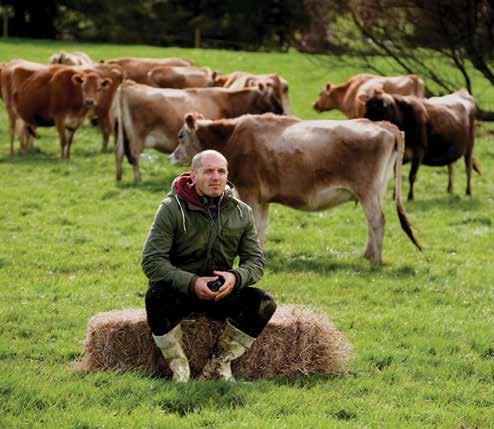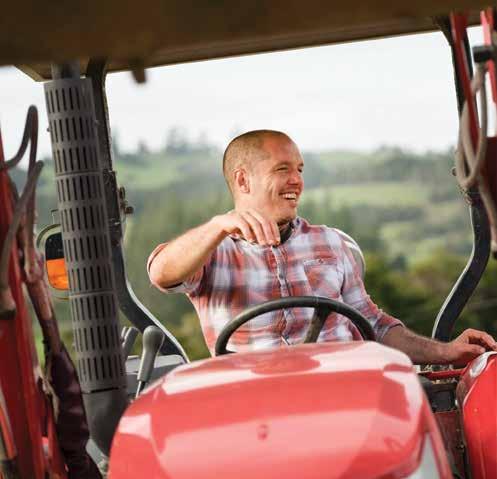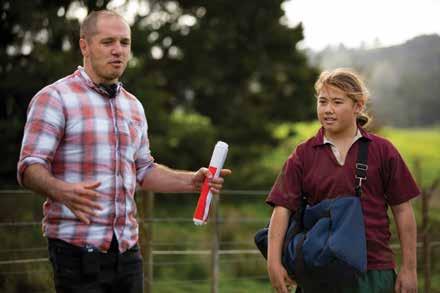
8 minute read
Hamish Bennett Q&A
IN FOCUS
Hamish Bennett Q&A
Advertisement
Up until now, Hamish Bennett has been a fulltime primary school teacher and a part-time filmmaker. But after the success of his debut feature film Bellbird both here and around the world, the Northlander has had to reverse course, shifting into full-time filmmaking and part-time teaching. We caught up with the 43 year old to reflect on the success of Bellbird, how COVID-19 has impacted his plans, and the importance of keeping the film set a safe place for his crew.
It’s almost been two years since you released Bellbird, you must be pleased with the great reception it received both here and around the world?
Totally. It certainly exceeded our expectations. We set out to make a film that my whānau and friends would be proud of. If they were into it then I was going to be happy. I probably kept my expectations quite contained as a protective mechanism. But what eventuated with Bellbird, seeing how well it was received by people, was a really rewarding experience. Even a couple of years later, I get messages from people who’ve connected in some way with the story, and that is a pretty gratifying thing. You finish a film and you put it out there, but the thing with movies is that they’ll always be around, they’ve got longevity, and with a bit of luck they’re going to continue to find new audiences. Given we’re proud of our film, that is a pretty lovely thought.

It was a simple story well told, for people who haven’t seen it, what is it about?
I’ve had a bit of practice doing this [laughs]. Bellbird is set over a year on a tiny dairy farm in rural Northland. Essentially it is about a farmer and his son battling to come to terms with the sudden loss of their much-loved wife and mother. On the outside looking in that might sound really grim but ultimately it’s a really hopeful story. It has a good sense of humour and it is very much grounded in community and relationships, and they are things that are very important to me.
There are some moments of real comedy in it as well, how did you capture those?
I couldn’t imagine writing anything that didn’t have humour in it, because that’s real life, or at least that’s the life that I know. Even when you go to a funeral or tangi, amongst the tears there is often laughter. People search for that - it’s a release. So you have to find those moments, and it was a lot of fun writing them... but at the end of the day it was our actors who had to bring those moments to life. In this respect, I was incredibly lucky; every actor brought so much more to their roles than was on the page, and not just from a humour perspective either. So much credit needs to go to them for the success the film has had.
It must have been awesome to film in your old home region and put that part of NZ onto the world stage?
It’s so lovely. One of the really great things about the comments and reviews, lots of them have made mention of the beautiful environment. The area where we filmed is a tucked away corner of the world that not many people outside of Northland know about, called Maungakaramea. Being able to make a film that is an ode to those kinds of places and those kinds of people was something I’ll always be grateful for.
Your first feature film and then COVID-19 arrived, how has that affected your plans for your next movie?
It has been interesting. When I made Bellbird I was a fulltime school teacher, but I’ve had to take a step back from fulltime teaching and focus on writing and film-making in a more fulltime capacity. At this stage I am writing for a range of producers and people, which has been really refreshing, but I am really keen to find some time to get into what I hope will be my second feature film. It is currently set in the
Pacific Islands, so with Covid that has obviously slowed the progress a wee bit for us. Hopefully in the near future we’ll be able to get over safely though, and start gathering all those experiences and story material that you can only get from spending time in a place.
What did you learn from your first feature film?
It was a huge learning curve for me. Probably one of the luckiest things for me as a director was that the film is set over a year, so we broke filming up into three blocks – summer, autumn and winter, to be able to cover the different seasons. The real benefit of that was it enabled me to step back from the shoot for a period of time, look at the footage and review where we were at. In many ways it was like we were shooting three short films and then combining them all. I’d imagine that if I’d shot for 25 consecutive days, it would have been a lot harder to see the wood for the trees. Being able to have a breather to see where we were at was so beneficial in that respect.
Safety is paramount at any work site, as a director what steps did you take to make sure that the film set was safe?
First and foremost, for safety it is recognising the environment you are in and leaning really heavily on the people who have the most expertise in that environment. I grew up in that world but I am not a farmer. Our main source of knowledge in that regard were the farmers on the set. The farm that we filmed on was a working farm, and the farmers who own it are family friends. It was really important to me that any of the procedures or protocols that we followed were cleared with them first. We were visitors to their world and from a health and safety point of view we took all of our cues from them, because they were the people who knew what they were talking about.
The film site has been compared to a building site (with a number of moving parts and people), so was it important that everyone had a clear plan each day?
Yeah, everyone did. Because we shot the film over three blocks, we had new people coming and going, and they picked up pretty quickly the requirements of the site. As much as I was the director, there were a lot of people leading in that respect. I remember a couple of crew members turned up on their first day and, although it was unintentional, they were almost treating the farm like it was our very own film set. They were really quickly told by established members of the crew that this is a working farm, not a film set, and that respect and care needs to be there at all times. And obviously they understood that and quickly adapted!

Were there any accidents during the filming of Bellbird?
No, we didn’t have any accidents. But one of the things we outlined early on was that if there was heavy machinery being used, we used the experts. Which in this case was the locals! Most people think they’d be sweet riding a quad bike, but as much as it might have been fun, we just had to ensure that everyone was protected and that the risk was minimised where possible.
You are used to controlling a class full of primary school kids, did that help from a safety point of view in filming?
Yeah, but not just from a safety point of view. There are so many parallels between teaching and directing. As a teacher you try to establish a culture or a tone in that environment that is warm and welcoming, and values all of the students and the skills they bring to the table. It’s about establishing clear expectations and being consistent with those expectations. It’s the same thing with a film set. You want to set a tone and create a culture that everyone buys into and wants to be a part of. If you can create that culture, then I guess the potential for harm occurring is lessened.
Filming in NZ, it doesn’t matter if you are from here or somewhere else, it must be nice to have ACC covering any injuries if they do happen?
Of course, it’s brilliant. It is security. You can put procedures in place to limit and prevent accidents from happening, but accidents do happen. So having that knowledge and insurance that all of the crew will be covered is vital for filming. Other countries don’t have that same luxury and it is very important that we have ACC.
Do you think it incentivises filmmakers to shoot in this country with ACC covering that part of their costs?
I am sure it does. I can’t imagine what it would be like to live or work in countries without these safeguards in place, where only people with money or health insurance can get healthcare. It’s a horrendous thought. That is obviously not the case in New Zealand and I am so grateful for that.
What advice do you have to any other filmmakers / directors coming through in NZ?
If you ever get the chance to make a film, I think the key thing is just to be grateful. There are so many creative hard-working people in the industry and the opportunity to be in that environment is such a privilege. That mantra of ‘don’t be a dick’ really does apply on a film set. It’s important to remember that regardless of your role in the film, you are no more or less important than anyone else there - everything comes back to relationships, and people need to feel valued. Little things like saying good morning to everyone at the start of the day and thanking everyone at the end of each day...they’re small gestures, but they matter.

